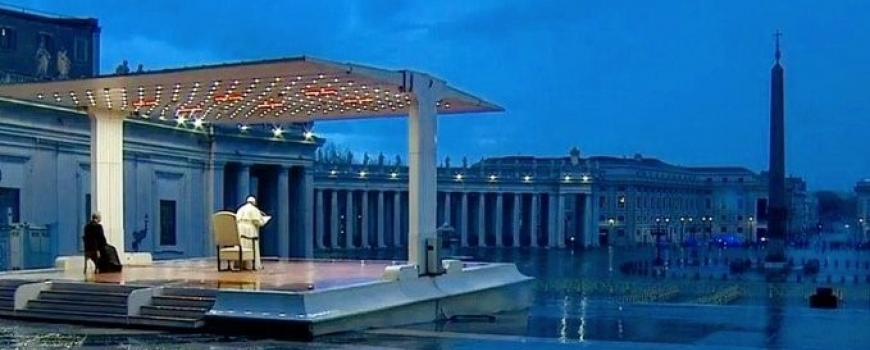During this time of COVID-19 we find ourselves exiled from our normal life rhythms and supports, and our feelings of stress, anxiety and fear are inevitably heightened. We are grieving real losses and anticipating others, and suffering with the illnesses of loved ones and our inability to companion the dying. The struggle of springtime rains, with their hope of new greenery and lush flowers, to overcome the chilly winds of winter mirrors our internal struggle to maintain hope in our anxiety.
Recognizing these experiences of fear, Pope Francis offered an extraordinary moment of prayer for the world on March 27 - an Urbi et orbi (from city of Rome to world) address. Such a papal address and blessing is normally reserved for the solemnities of Easter and Christmas. It was a powerful invitation to be in touch with our roots and to keep alive the memory of those who have gone before us. He chose the calming of the storm story which begins at Mark 4:34, where Jesus is sleeping in the boat with his disciples as the storm rages and they cry out in fear feeling that he didn’t care. In his homily, Francis relates this to our experience of helplessness today, and invites us to recognize how our common experience of pandemic brings us to the important awareness of our “common belonging, of which we cannot be deprived: our belonging as brothers and sisters.”
Francis invites us to recognize that we may not have been “shaken awake by wars or injustice across the world, nor did we listen to the cry of the poor or of our ailing planet. We carried on regardless, thinking we would stay healthy in a world that was sick”. He thus connects our experience of being in the same boat to the call to live an integral ecology; he urges us to place the pain we experience at the suffering of both disadvantaged peoples and the ecosystems that unite us all in service of reconciliation and healing action.
This week marks Holy Week for the Christian community and Passover for our Jewish brothers and sisters. These times normally include intimate gatherings with loved ones and the larger community. Their remembrances in the springtime season are gifts of hope, and we can find ourselves and our current moment expressed in the stories of this season. A range of human feelings and encounters are found in the stories of the deliverance of Passover, the acts of service in the washing of the feet, the communion of the Last Supper, and the suffering of Good Friday. We can also see ourselves in the new hope of Easter. The rituals and symbols of these holy days are intricately connected with nature, from the local tree branches (palms) of Palm Sunday, to the springtime birth of lambs. The stark wooden cross is transformed with lilies and living waters bless us anew. Easter season decor matches the purples, yellows, pinks and white so common in our spring wildflowers and blossoming trees.
During our isolation, we hear many stories of creativity and self-giving. Families are recreating rituals at home. Children are finding the branches in their own backyards that can symbolize palms. We are re-discovering ways to gather at home for worship and ritual at our dining room tables and in living rooms, uniting with the spirit of the Jewish Passover seder and the house churches of the first Christians. Being at home, we can take more time to enjoy the wonder of nature in our own backyards, in parks, in the care of our neighbors, in our actions of solidarity, and in prayer for the world.
As Pope Francis invited, may we all “make room for the creativity that only the Spirit is capable of inspiring. It means finding the courage to create spaces where everyone can recognize that they are called, and to allow new forms of hospitality, fraternity and solidarity.” May we each be blessed in whatever be our commemorations - Passover, Easter or springtime itself. The stories we share and the care we each bring to our common home, the people and earth around us, will be our legacy. Future generations will retell the story of the steps taken by us, the people who journeyed through the 2020 pandemic with hope and loving care for our common home.




